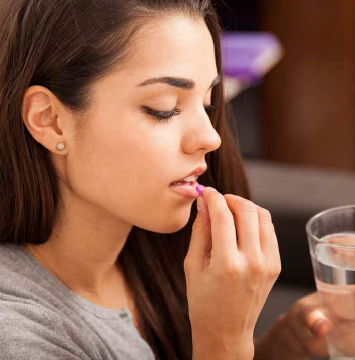Biotin Supplementation May Interfere with Clinical Laboratory Test Results
Over the last few years there has been a heightened awareness of potential effects of dietary biotin supplementation on the results produced by immunoassay-based clinical laboratory assays. (1-3) Biotin (vitamin B7) has been touted as a beneficial dietary supplement for various non-prescribed uses such as purported benefits for hair and nail health, in addition to being used medically for treatment of biotinidase deficiency, diabetic neuropathy, multiple sclerosis, and other neurologic and rheumatologic conditions. (1,4)
Biotin is also commonly used in immunoassays in the clinical laboratory as a conjugate for analytical antibodies and detection enzymes, due to its extraordinary affinity for avidin/ streptavidin. For example, streptavidin-coated magnetic beads may be added to reaction mixtures to allow for the isolation of analyte-antibody complexes prior to washing of excess detection antibody from reaction mixtures. In immunoperoxidase reactions in histopathology, avidin may be used as a bridge between biotin-labeled secondary antibodies and biotinylated peroxidase prior to the addition of a colored substrate for microscopic visualization.
 Biotin tablets are available in doses of up to 10 milligrams (10,000 micrograms), which means some individuals ingest quantities hundreds or thousands of times greater than the dietary recommendation of 30 micrograms per day. (1,2) The presence of biotin at these levels in blood samples may interfere with the avidinbiotin reaction and result in inaccurate laboratory test results. For “sandwich” assays involving the capture of analyte by fixed antibody and detection with secondary antibody, circulating biotin may yield falsely low results. For competitive assays in which biotinylated reagent analyte competes with measured analyte for available detection antibody, this may result in falsely high results. The issue of biotin interference has progressed to the point that the US Food and Drug Administration (FDA) issued a warning on this topic in November, 2017, in which the agency states that it is “working with stakeholders to better understand biotin interference with laboratory tests, and to develop additional future recommendations for safe testing in patients who have taken high levels of biotin when using laboratory tests that use biotin technology.” (5)
Biotin tablets are available in doses of up to 10 milligrams (10,000 micrograms), which means some individuals ingest quantities hundreds or thousands of times greater than the dietary recommendation of 30 micrograms per day. (1,2) The presence of biotin at these levels in blood samples may interfere with the avidinbiotin reaction and result in inaccurate laboratory test results. For “sandwich” assays involving the capture of analyte by fixed antibody and detection with secondary antibody, circulating biotin may yield falsely low results. For competitive assays in which biotinylated reagent analyte competes with measured analyte for available detection antibody, this may result in falsely high results. The issue of biotin interference has progressed to the point that the US Food and Drug Administration (FDA) issued a warning on this topic in November, 2017, in which the agency states that it is “working with stakeholders to better understand biotin interference with laboratory tests, and to develop additional future recommendations for safe testing in patients who have taken high levels of biotin when using laboratory tests that use biotin technology.” (5)
Fortunately, ingested biotin does not persist in the body for very long. Biotin blood levels likely peak within a few hours of ingestion. (1) The half-life of biotin within the body is about 2 hours, but may be longer in individuals with long term regular biotin intake. (2) Some studies document assay interference persisting for 24 hours following high dose biotin ingestion, with effects possibly lasting longer in pediatric patients. (2) Clinicians should be aware of the potential for biotin therapy or biotin supplementation to interfere with laboratory testing. If clinically prudent, patients should be advised to refrain from ingestion of biotin supplements for at least two to three days prior to having their blood draw for clinical testing.
References
- Paxton A: Beauty fad’s ugly downside: test interference. CAP Today 2016; 30(9):1.
- Li D, Radulescu A, Shrestha RT, Root M, et al: Association of biotin ingestion with performance of hormone and nonhormone assays in healthy adults. JAMA2017; 318(12):1150-1160.
- Chun KY: Biotin interference in diagnostic tests. Clin Chem 2017; 63(2):619-620.
- Batista MC, Ferreira CES, Faulhaber ACL, Hidal JT, et al: Biotin interference in immunoassays mimicking subclinical Graves’ disease and hyperestrogenism: a case series. Clin Chem Lab Med 2017; 55(6):e99-e103.
- https://www.fda.gov/medicaldevices/safety/alertsandnotices/ucm586505.htm. Accessed January 8, 2018.

